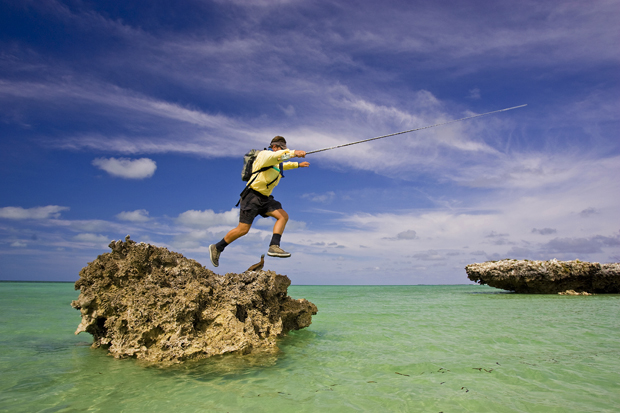These days I can sit here in my home office in Cornwall, a beautiful corner of southwest England, and produce work for many different clients all over the world. Technology has given me this ability, but it was not too long ago when I went to my first computer lecture at university and didn’t even know what a mouse was, let alone understand terms like RAW, aRGB, RAM, Gigabytes, and Photoshop!! Talk about times a’changing. If there is one single thing in my working life that I have embraced to the max, it’s the whole digital photography thing. I love it, and I love the control and flexibility it gives to somebody like me who works for themselves and on their own.
So what do I actually do then? Well, most of my work revolves around photographing and writing about various kinds of fishing all over the world for many kinds of magazines and books, as well as making TV programmes over here about saltwater fishing. I also do a bit of consultancy-based work for fishing tackle companies. At heart, I am a saltwater-fishing junkie who eventually worked out that he had no choice but to pursue some kind of career in the sport fishing industry, and from a photography point of view, I am utterly driven to spend time around fishing that is fun, dynamic, and also has the potential for making some strong images. If the fishing visually turns me on, then it’s a good bet I will like the actual fishing itself. Before we start getting into the nuts and bolts of fishing photography, you need to know that I have never had a day’s instruction in my life. I am a self-taught photographer who continues to learn new stuff every single day. I make lots of mistakes and I am not the least bit afraid to seek advice and opinions. If I can, you can. What I am trying to say, I guess, is that so many anglers could easily take much, much better photographs of their fishing with just a bit more thought and application.
Fishing is the coolest thing in the world, is it not? My obsession with photographing fishing came about mainly because I wanted to try and show people just how awesome fishing could look. I have had this long-held belief that the better I can make the sport of fishing appear to the outside world then perhaps it might just do our sport a little bit of good in the long run. A touch naïve, perhaps, but I have always believed that I owe it to this sport to make it look as impressive as I can with my limited talents. I guess the kinds of fishing I most like to be around are a reflection of me as an angler and a photographer. Does that make sense?
So, what makes a good fishing photograph? Indeed, what makes the viewer take a longer look at an image? What is it about an image that holds someone’s attention a bit longer, or perhaps appeals to their own fishing soul in a way that almost communicates what fishing means to them? Do you sometimes look at your own fishing photographs and wonder how you might have made them better, or perhaps just a little different?
Forgetting about the actual technicalities of photography for the moment, the biggest single thing I can offer, possibly, is how we “see” or visualise a photograph. Put a bunch of us together, say, on a steelhead river, and I bet we all end up with a whole lot of different photographs. The outstanding Jeff Bright does lots of work for this magazine, and I bet the two of us could photograph for a whole day together and come up with essentially two different shoots at the end of it. We all “see” things differently. I would describe Jeff as an artist with his cameras, and I look at some of his work and just wish that I could “see” what he does at times. The photographs I shoot are simply what I personally visualise and then want to try and shoot. What you see will be different to me. We are all right and we are all wrong, I suppose. Wouldn’t it be boring if we all made fishing look the same?
We can talk about all kinds of different things in this column, so please give me some feedback through my website at www.henry-gilbey.com. I suppose that one of my overriding philosophies when out photographing fishing is that it will most likely not happen again. I have to be ready when something goes off, because fishing is like that, of course. It can suddenly just happen. If I am messing around and not concentrating all the time then I am missing potential shots, and I just can’t forgive myself if I don’t do the best job I possibly can at capturing these images. Sure, there are any number of far better photographers out there than me, but because I specialize so much in fishing, I guess I have a good idea what it takes to photograph this sport of ours. I have always believed that only a true fisherman can really know how to make fishing look good via photos or films. This is my job and I need to shoot photographs that I can sell, but never for one second think that I don’t completely and utterly love what I do just because I need to make a living. It can never be about the money when you work in fishing.
So, how about if in this column I do my best to share what I have learned and continue to learn about photographing fishing, in order to help you make your own fishing photos better, while also giving you some insight into this sometimes strange world of working in fishing that people like me are driven to do….





